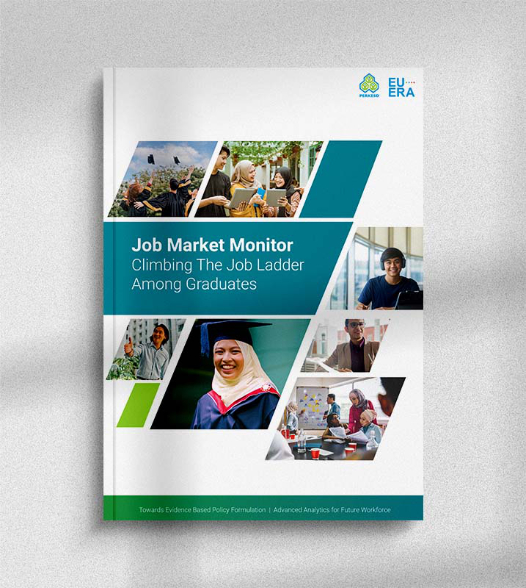Book Title
Job Market Monitor Climbing The Job Ladder Among Graduates
Summary
Coordination in the current state of graduate issues should be framed according to the endto-end journey of graduates starting from their higher education institutions (HEIs) life up until employment. Graduates need to be monitored from time to time and not only look from one aspect, for example, only focusing on the educational aspect, which will leave a black box in developing a more efficient and sustainable policy. Job Market Monitor: Climbing The Job Ladder among Graduates is one of the first efforts to observe Malaysian graduate employment.
Among the key findings are:
The need to increase the readiness of graduates to enter the labour market. The survey showed that graduates who chose STEM as their field of study earned a salary of RM2,087.69 with a salary difference of 8.6% more compared to the social sciences (RM1,923.93). The analysis also shows that graduates need to change jobs to get a higher salary compared to their first job with STEM increasing by 29.3% and social science by 24.9%. This has led to uneven satisfaction with educational programs in HEIs. This phenomenon can be attributed to the underutilisation of skills among graduates as they enter the labour market.
In preparing graduates to enter the labour market, industrial elements and internship programmes are the two main things that need to be initiated. Our survey proved that 40.1% of graduates attending the career programmes found a job in the PMET job categories compared to only 30.1% of graduates not attending any career programmes. In addition, most (87.1%) of graduates stated that bringing industrial elements into the classroom has improved their work readiness, with 90.9% agreeing that internships highly contributed to increasing work preparation. However, internship programmes need to be longer than 3 months to maximise their effectiveness where graduates who undergo internship programme for more than 3 months have a good percentage of getting jobs in the PMET category with a percentage of 48.4% compared to 43.5% for industrial training of less than 3 months.
Survey findings show that educational mismatches decrease over time as graduates undergo job mobility. The educational mismatch was reduced from 62.8% to 56.8% when they switched jobs. The reduction in educational mismatch has positively impacted the average salary of graduates, where graduates working in the PMET job category have increased from RM2,009.98 to RM2,649.91. Even so, the mismatch has had an effect on the wage gap between the PMET and non-PMET job categories where the gap widens from 33.7% to 48.9%. The low salary among graduates working in the non-PMET job category resulted in an unbalanced income-to-expenditure ratio leading to 79.1% of graduates being dissatisfied with their salary.
For further information on the report, please email enquiry@euera.org.





